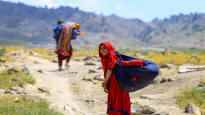Health officials fear cholera and other diseases are spreading in the quake zone. About 10,000 buildings have been damaged.
A powerful earthquake took home thousands of people in eastern Afghanistan and buried wells under the ground and boulders.
The victims of the quake are facing a new threat. Authorities consider the risk of cholera serious due to lack of clean water.
The Afghan Ministry of Health and the UN Office for the Coordination of Humanitarian Affairs (OCHA) are rushing to rebuild the wells in the devastated area. Medicines and other relief supplies have been delivered to the province of Paktia, but food and water shortages are acute.
Natural disaster test for Taliban government
Afghanistan is one of the poorest countries in the world. It has been dependent on international aid for decades.
Many countries and communities, including the EU, have now pledged emergency aid to the region.
The Taliban leadership in Afghanistan has also called for the release of frozen funds abroad to help the victims of the earthquake and the country.
The housing building is in a hurry before winter
Afghanistan’s health care is in a weak position. Hospitals have more expertise in treating victims of violent injuries and bombings than in dealing with earthquake injuries.
There is also a rush to build new housing. In the harsh weather conditions in the mountains, coping with tent accommodation is almost impossible. In the first phase, there will also be a shortage of temporary accommodation in the quake area.
UN High Representative for Afghanistan Ramiz Alakbarov visited the devastated area on Saturday by helicopter. Part of the quake area is also dependent on airborne assistance.
